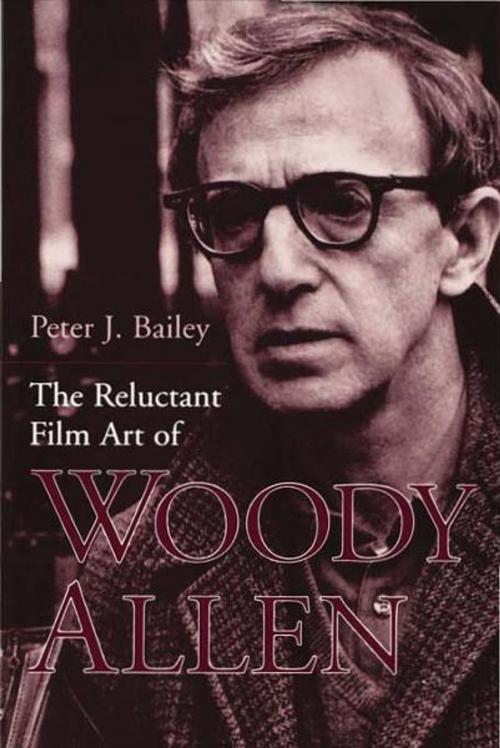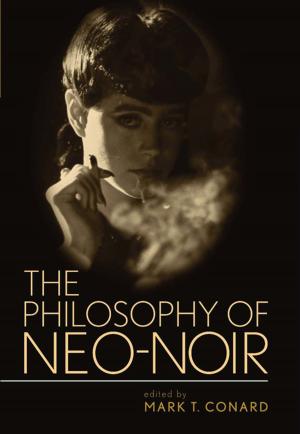The Reluctant Film Art of Woody Allen
Nonfiction, Entertainment, Film, History & Criticism, Biography & Memoir, Entertainment & Performing Arts, Fiction & Literature, Literary Theory & Criticism| Author: | Peter J. Bailey | ISBN: | 9780813139241 |
| Publisher: | The University Press of Kentucky | Publication: | September 29, 2010 |
| Imprint: | The University Press of Kentucky | Language: | English |
| Author: | Peter J. Bailey |
| ISBN: | 9780813139241 |
| Publisher: | The University Press of Kentucky |
| Publication: | September 29, 2010 |
| Imprint: | The University Press of Kentucky |
| Language: | English |
For three decades, no American filmmaker has been as prolific -- or as paradoxical -- as Woody Allen. From Play It Again, Sam (1972) through Celebrity (1998) and Sweet and Lowdown (1999), Allen has produced an average of one film a year, yet in many of these films Allen reveals a progressively skeptical attitude toward both the value of art and the cultural contributions of artists.
In examining Allen's filmmaking career, The Reluctant Film Art of Woody Allen demonstrates that his movies often question whether the projected illusions of magicians/artists benefit audience or artists. Other Allen films dramatize the opposed conviction that the consoling, life-redeeming illusions of art are the best solution humanity has devised to the existential dilemma of being a death-foreseeing animal. Peter Bailey demonstrates how Allen's films repeatedly revisit and reconfigure this tension between image and reality, art and life, fabrication and factuality, with each film reaching provisional resolutions that a subsequent movie will revise.
Merging criticism and biography, Bailey identifies Allen's ambivalent views of the artistic enterprise as a key to understanding his entire filmmaking career. Because of its focus upon filmmaker Sandy Bates's conflict between entertaining audiences and confronting them with bleak human actualities, Stardust Memories is a central focus of the book. Bailey's examination of Allen's art/life dialectic also draws from the off screen drama of Allen's very public separation from Mia Farrow, and the book accordingly construes such post-scandal films as Bullets Over Broadway and Mighty Aphrodite as Allen's oblique cinematic responses to that tabloid tempest.
By illuminating the thematic conflict at the heart of Allen's work, Bailey seeks not only to clarify the aesthetic designs of individual Allen films but to demonstrate how his oeuvre enacts an ongoing debate the screenwriter/director has been conducting with himself between creating cinematic narratives affirming the saving powers of the human imagination and making films acknowledging the irresolvably dark truths of the human condition.
For three decades, no American filmmaker has been as prolific -- or as paradoxical -- as Woody Allen. From Play It Again, Sam (1972) through Celebrity (1998) and Sweet and Lowdown (1999), Allen has produced an average of one film a year, yet in many of these films Allen reveals a progressively skeptical attitude toward both the value of art and the cultural contributions of artists.
In examining Allen's filmmaking career, The Reluctant Film Art of Woody Allen demonstrates that his movies often question whether the projected illusions of magicians/artists benefit audience or artists. Other Allen films dramatize the opposed conviction that the consoling, life-redeeming illusions of art are the best solution humanity has devised to the existential dilemma of being a death-foreseeing animal. Peter Bailey demonstrates how Allen's films repeatedly revisit and reconfigure this tension between image and reality, art and life, fabrication and factuality, with each film reaching provisional resolutions that a subsequent movie will revise.
Merging criticism and biography, Bailey identifies Allen's ambivalent views of the artistic enterprise as a key to understanding his entire filmmaking career. Because of its focus upon filmmaker Sandy Bates's conflict between entertaining audiences and confronting them with bleak human actualities, Stardust Memories is a central focus of the book. Bailey's examination of Allen's art/life dialectic also draws from the off screen drama of Allen's very public separation from Mia Farrow, and the book accordingly construes such post-scandal films as Bullets Over Broadway and Mighty Aphrodite as Allen's oblique cinematic responses to that tabloid tempest.
By illuminating the thematic conflict at the heart of Allen's work, Bailey seeks not only to clarify the aesthetic designs of individual Allen films but to demonstrate how his oeuvre enacts an ongoing debate the screenwriter/director has been conducting with himself between creating cinematic narratives affirming the saving powers of the human imagination and making films acknowledging the irresolvably dark truths of the human condition.















